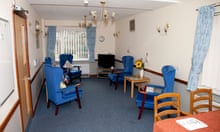Robert Dunn* had been living with dementia at home for seven years when, after one fall too many, his son and daughter took the decision to move him. The 92-year-old former accountant moved into Limegrove, a £1,100-a-week care home in Surrey whose operator, Anchor, promised customers “care encompassing every aspect of wellbeing”.
After he died five months later, a social services investigation by Surrey county council found that care was provided by “neglectful” agency staff, there were “major failings as an organisation” and “a high level of unwitnessed incidents”. He was probably “a victim of organisational abuse”, the investigation concluded.
Now his daughter Susan is demanding the return of almost £20,000 in fees plus compensation, alleging that her father’s death was “accelerated due to poor care and neglect”.
There were unexplained cuts and bruises on his head and arms, bloodstains on his clothes, which would remain unchanged for days, and medicines and food supplements went untaken, she said.
Before he died, Robert contracted Covid, but the home at first declined Susan’s request to call a GP, she said. It insisted he was not ill, just not eating. When he was taken by ambulance to hospital, he had not eaten for six days and was severely dehydrated. He died on 12 February 2022.
Alzheimer’s disease and vascular dementia meant Robert’s needs were complex, but they were not rare. An estimated 944,000 people in the UK are living with dementia, and the number is expected to rise to more than 1.6 million by 2050. More of us will be searching for care homes, checking ratings awarded by Care Quality Commission inspectors.
Limegrove was “good”, the most common rating. But it is one of 291 care homes in England looking after people with dementia whose rating fell from good to “requires improvement” after inspection in 2022. Another 56 fell from good to “inadequate”.

Susan found the wing where Robert was placed “soulless”. The other men mostly stayed in their rooms. The few that ventured out sat in the lounge all day unstimulated. “It was just waiting to die,” she said.
As time went on, she realised Robert was not being washed, dressed and breakfasted properly. He was refusing, but in Susan’s view the care home needed to find a way.
“My main concern is how these people are being trained,” she said. “Unless these carers are properly trained in dementia then the residents are just a number, there to be fed at mealtimes, fill in the care sheet, plonk them in a chair. It is very grim.”
She added: “I understand carers are not paid well and we haven’t got enough carers, but the answer isn’t bringing in agency staff who can’t do the job. In my dad’s case, I believe that led to his death. I am certain if he was still at home he would still be alive now.”
After Robert’s death, Anchor admitted the home “fell well short”. It apologised for taking three days to tell Susan her father had stopped eating and drinking, for not telling her he had lost 6kg (13lb) in two weeks, and for failing to call a GP.
In a statement, Jane Darani, Anchor’s director of care services for London and the south-east, said it was “sincerely sorry” and, having apologised to the family, was working “to address their concerns and acknowledge that there were elements of the service that fell below the high standards of care we expect”.
“A robust action plan was introduced at the time, working in partnership with the local authority and our regulator the Care Quality Commission,” she said, adding that there had been improvements at the home, changes in staff, new appointments made in the management team, and that “the health, safety and wellbeing of our residents is paramount”.
David Tucker went through similar distress after he chose Rothsay Grange care home in Andover, Hampshire, to provide four months of respite care for his mother, Lorna, who has Alzheimer’s disease. It had a “requires improvement” rating when she moved on to its “Memory Lane” dementia floor this summer.
after newsletter promotion
The council covered the approximately £1,300 weekly costs of a service about which the CQC had concluded “some aspects … were not always safe”.
“To call them care homes is a total misnomer,” said Tucker, who took photos of faeces on a bathroom floor for three days, vomit on a sofa, broken furniture and curtains hanging off their tracks. “Going on to the dementia floor was like going on to another planet,” he said.
He said he sat in the dining area for 90 minutes and saw five or six people with dementia left unattended for all that time. “They didn’t stimulate them properly, feed them properly and give them physical exercise, and it’s just not good enough,” he said. He appreciates how hard caring for people with dementia is, and said many of the staff were “wonderful”, but he said “the system was letting them down”.
Rothsay Grange’s CQC report in July 2020 found “the Memory Lane floor lacked staff in communal areas, meaning people were at increased risk of harm”. The most recent rating upgraded the home to “good” and said “improvements had been made in safe management of medicines, governance and staffing.”
Tucker said: “We need to reassess how we keep these people happier, healthier and fitter and slow their decline. We should be giving them a much better experience in their final months and years, not just taking their money, saying we’re feeding them and giving them a bed, which seems to be the limit of it.”
Barchester, which runs Rothsay Grange, said the latest CQC report outlined “an emphasis on supporting residents to remain active and have maximum choice and control of their lives.” It said Tucker’s complaints were not made officially at the time, “so we cannot comment on these accusations in detail”.
A spokesperson said: “We take every issue raised seriously, and are committed to the safety and wellbeing of all of our residents, relatives and staff. All of our staff undergo comprehensive dementia training and Rothsay Grange has been supported by one of our specialist dementia trainers to ensure that the team is delivering the best care.”
* Surname has been changed.










